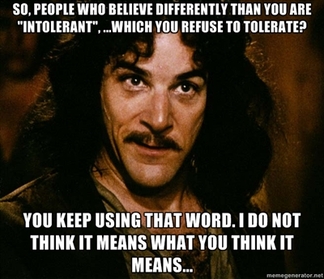Years ago my friend Stephen and I began collecting what we labeled “Repetitive Redundancies”, those word combinations, in which an adjective is added to a superlative: I understand the intent is usually to emphasize the matter, however, the end result is often to lessen the power of the word being modified. We had a lengthy list compiled, many of which have since been forgotten, yet several are common and come easily to mind: very unique, almost decimated, completely razed. (Interesting side note – Microsoft grammar checker had a problem with only one of those combinations) Perhaps more annoying are those ridiculous marketing materials that use multiple words to describe a product or idea. Take this chalkboard sign spotted outside a restaurant in Boston, advertising the day’s special: Beef Bourguignon in a Wine Sauce. Or the training manual for a women’s gym that explained, “a mental thought process takes place in the mind.” Recently, I heard an ad on the radio for a certain Mall chain claiming they were offering “extra extraordinary” pricing.
My point is, I really dislike redundancy, though I, myself, (catch that one) may be guilty from time-to-time: for instance, now. You see, a short time ago in my post on tolerance and diversity, I talked about the polemic that plagues our culture. As some of the responses I received served only to emphasize my point, and I continue to be disturbed by the lack of civility I witness regularly, I have decided to address this matter once more.
Now, I trust my atheist/agnostic/irreligious/secular (choose your own label) friends and readers will be patient with me if I get a little “preachy”, since I really want to take my Christian/churched/religious friends to task here.
For those who may not know much of my history, a simple way to explain my natural political leanings from an early age is to say that I had “Goldwater ’64” stickers on my lunch box in first grade. When Lyndon Johnson won that election, I simply crossed out the “4” and penned in an “8.” However, since Barry didn’t run again, I became a Nixon supporter, then Reagan and… well, you can easily guess the rest. So, I was a Republican long before I was a Christian. Years later when I came into relationship with God, at first, that relationship had little effect on my politics. But one thing that has happened thanks to God and his Spirit who lives in me is, I have come to understand the importance of loving and respecting those whose opinions differ from my own.
This change didn’t happen all at once, in fact, it was only about three or four years ago that at a gathering for the National Day of Prayer, at which I had been asked to lead prayers for our President, Governor and local elected officials, I found myself publicly confessing and repenting of an ungodly attitude. In preparation for the event, I had spent time looking for a Biblical framework concerning prayers for those in leadership. I thought immediately of Paul’s counsel to Timothy: “I urge, then, first of all, that petitions, prayers, intercession and thanksgiving be made for all people— for kings and all those in authority, that we may live peaceful and quiet lives in all godliness and holiness.” (1 Timothy 2:1-2 NIV) Good stuff, but I decided to keep digging. What I found surprised and convicted me. Often, though many Old Testament prophets confronted and challenged those in leadership, they almost always did so with respect. One example that stood out to me in particular was Daniel. Many are familiar with the story of Daniel in the Lions Den, but when you read the whole story you find that Daniel had a unique relationship with the kings of Babylon, Media and Persia. For the sake of space and time I will speak here of just one, Nebuchudnezzar.
You see Daniel, along with a large number of people living in Judah, was taken into captivity by the Babylonian king, Nebuchudnezzar, in about 606 BC. He, and three other young Hebrews were chosen to serve the king. These young men were taken from their homeland, forced into servitude (and likely castrated) and given new names that honored a pagan god, yet they always showed respect for the king, even referring to him as “lord.” In Daniel 2:37-38, addressing the king Daniel says: “Your Majesty, you are the king of kings. The God of heaven has given you dominion and power and might and glory; in your hands he has placed all mankind and the beasts of the field and the birds of the sky. Wherever they live, he has made you ruler over them all.”
Daniel’s respect had nothing to do with his personal feelings regarding his treatment or about the king’s policies or personality. Rather, it was due to the fact that he understood what the Apostle Paul later wrote to the church in Rome: “Let everyone be subject to the governing authorities, for there is no authority except that which God has established. The authorities that exist have been established by God.” (Romans 13:1 NIV) (Huh, I guess even Paul used redundancy to make his point – but at least he rephrased).
So, while I may (and often do) take issue with the policies of the President; or Governor, or members of Congress, or for that matter, my employer or Pastor, I must always pray for and honor them. In fact, if I call them nasty names, ridicule them, make fun of them or belittle them in any way I am guilty of sinning against God, for I am expressing that God somehow erred by placing them in authority.
This is the realization I came to that evening a few years back which caused me to confess and repent. It is one I pray that all those who claim the name of Christ will come to, if they have not already done so, in order that we may live at peace with everyone, as much as it depends on us. (See Romans 12:18)
To drive the point home further, just this morning in my quiet time with God, I was reading in the book of Acts about Paul before the Sanhedrin (the Jewish ruling council). When Ananias didn’t like something Paul said he ordered those standing near Paul to strike him on the mouth. Paul reacted with a harsh rebuke of his own saying, “God will strike you, you whitewashed wall…” When he was then challenged for speaking in such a way to the high priest, Paul humbly replied, “Brothers, I did not realize that he was the high priest; for it is written: ‘Do not speak evil about the ruler of your people.’” (see Acts 23:1-5)
So there you have it – a gentle chiding for us church folk. For those of you who have issues with the church and Christians – I’m sorry we can be less than Christ-like at times. And hey, perhaps you could try being a little more tolerant with us as well?
Now I leave you all with the following musical selection from Buffalo Springfield. Listen closely and enjoy.
As always, your friend,


 Last evening I climbed on my trusty steed and headed south toward Boston. The simple act of dealing with Boston traffic on two wheels might be adventure enough for some, (though its not something I would do just for fun) but I was on a mission. As part of my quest for the reflection of Christ in contemporary culture I was headed to a vision service called The City Boston. I know – sounds vague – let me explain.
Last evening I climbed on my trusty steed and headed south toward Boston. The simple act of dealing with Boston traffic on two wheels might be adventure enough for some, (though its not something I would do just for fun) but I was on a mission. As part of my quest for the reflection of Christ in contemporary culture I was headed to a vision service called The City Boston. I know – sounds vague – let me explain. As I scroll though my facebook feed I am often struck by the fact that I have an extremely diverse set of friends. I see this fairly often but I don’t think it has ever been more apparent than in the past couple of days since the Supreme Court’s decision about The Affordable Care Act and Hobby Lobby. Often this diversity pleases me – I am very glad that despite our differences I am able to stay connected and friendly with people who hold different (at times extremely different) views than I.
As I scroll though my facebook feed I am often struck by the fact that I have an extremely diverse set of friends. I see this fairly often but I don’t think it has ever been more apparent than in the past couple of days since the Supreme Court’s decision about The Affordable Care Act and Hobby Lobby. Often this diversity pleases me – I am very glad that despite our differences I am able to stay connected and friendly with people who hold different (at times extremely different) views than I.
 I’m sure we have all heard the analogy of how a single action can have far reaching affects. Often we are told to consider how far the ripples extend when a small pebble is tossed into water, further emphasizing the fact that a single pebble sends out those ripples in all directions simultaneously.
I’m sure we have all heard the analogy of how a single action can have far reaching affects. Often we are told to consider how far the ripples extend when a small pebble is tossed into water, further emphasizing the fact that a single pebble sends out those ripples in all directions simultaneously.
 I know…I know… too cliche, nevertheless it is true. Yet, before a single step is taken, any worthy quest requires a good deal of planning and preparation.
I know…I know… too cliche, nevertheless it is true. Yet, before a single step is taken, any worthy quest requires a good deal of planning and preparation.